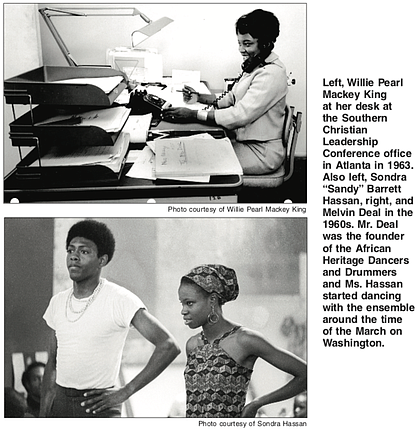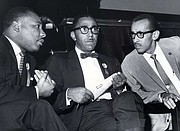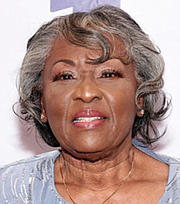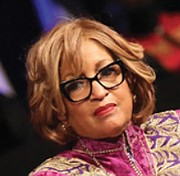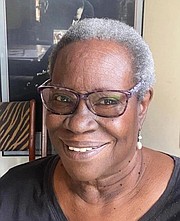Women at the first March on Washington: A secretary, a future bishop and a marshal
Adelle M. Banks/Religion News Service | 8/24/2023, 6 p.m.
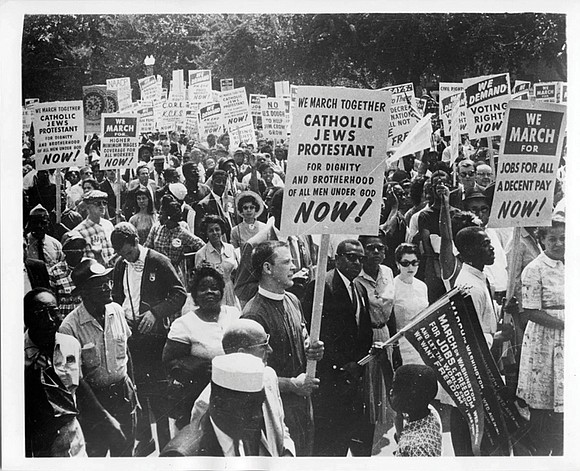
In front of the crowds and the cameras, the speeches of the Dr. Martin Luther King Jr. and other men loomed large 60 years ago at the March on Washington.
But the women, including those of faith, who played roles in its organization, its music and its news coverage were mostly left off the official program.
“They did not accept their exclusion quietly,” stated the National Museum of African American History and Culture, in a description posted on its website ahead of the anniversary.
“Individuals like Anna Arnold Hedgeman of the National Council of Churches strategized with others and convinced (organizer Roy) Wilkins to include a female speaker. Only one woman spoke: Daisy Bates, NAACP chapter president and an adviser to the Little Rock Nine.”
The Rev. Barbara Williams-Skinner, who came to Washington as the first female executive director of the Congressional Black Caucus a decade after the march, recalls prominent Black women leaders of that era sharing with her their “anger and angst” of having to sit silently that day.
The co-convener of the National African American Clergy Network said that, although they may not have had much of a voice that day, she is certain of the influence of women, famous and unfamiliar, on the march’s success from behind the scenes.
“If anything got organized, the women were putting in extra time,” she said, “even though they faced the unfairness of not being able to speak.”
As the nation marks the 60th anniversary of the March on Washington, Religion News Service talked to three women— a secretary in Dr. King’s office, a schoolgirl who became a bishop and a high school grad who helped escort Malcolm X — about their memories and roles in that historic moment.
The interviews were edited for length and clarity.
Willie Pearl Mackey King
Willie Pearl Mackey King was the personal secretary and administrative assistant to the Rev. Wyatt Tee Walker, executive director of the Southern Christian Leadership Conference.
She worked closely with Dr. Martin Luther King Jr. (no relation), who was a co-founder of the SCLC, as well as with Rev. Walker and others who organized the march. She arrived in D.C. weeks before the gathering and left in time to watch it on TV in Atlanta with SCLC staffers. Mrs. King, 82, is a member and former trustee of a Baptist church in Silver Spring, Md.
What was your role in the plans for the March on Washington?
Mrs. Mackey King: I came to Washington, probably the first time six weeks before the march because Wyatt Tee Walker was the lead person on Dr. King’s staff planning the march with a lot of help. His immediate staff from Atlanta were very much involved looking at logistics, thinking about crowd control, how many people we were expecting and, certainly, they did not expect, from everything I heard, the number of people that turned out. They didn’t expect 250,000 people. No. No. No. They were thinking of a much smaller group from what I could hear, what I saw discussed.
What was it in particular that was your task as you worked on this?
Mrs. Mackey King: Taking notes, keeping the water pitchers filled (laughs). Going out getting the food, typing up what they had come up with, so that they can review it.
What did you think when you saw it on TV, after all that typing and water pitcher filling?
Mrs. Mackey King: That’s not the speech! (laughs) That’s not what he said. You asked and I’m going to tell you the truth. That was my reaction. Oh my goodness. All that hard work and he’s not going to give the speech? He just left completely what they had worked on and agreed to. He was saying (singer) Mahalia Jackson’s thought because she was saying, “Martin, tell them about the dream, tell them about the dream.”
What strikes you about it to this day when you think about the fact that we’re at 60 years from the March on Washington?
Mrs. Mackey King: The thing that always comes to the forefront of my mind is the thing that Dr. King preached the most of all, non-violence — how we have let that slip through our fingers and how violent our society is. I think about the fact that it’s a joke now when people talk about equal job opportunities. We made progress in the early days, yes, but it seems that we’ve gotten complacent, relaxed. A few have made it and the masses are still struggling for equal job opportunities.
What did it mean for you to have the role you did in the preparations for the March on Washington, especially as a woman of faith?
Mrs. Mackey King: To be honest, I did not comprehend the importance of what was happening at the time. It was a job. I was happy to have a job. It was the first job out of a cotton field and the best thing that I had had, really. So I didn’t really understand. It was only later when I realized, oh my goodness, this was very important that I was doing. At the time, it did not have a specific important meaning.
What about significance for the nation 60 years later?
Mrs. Mackey King: I would hope, in my humble opinion, that the nation would look back at where we were, and where we are today and see that working together, we can benefit each other. Separating us is not the thing we should do. We should all try and come together to make this country the great country God intended it to be. We can’t do it fighting each other, separating the races and cultures. We have got to come together.
Bishop Vashti Murphy McKenzie
Bishop Vashti Murphy McKenzie was on the National Mall with her mother and aunts, part of a publishing family that was covering the march for The Afro American newspaper.
Then 16, she recalled being dressed that day like she was going to church. Bishop McKenzie, 76, a retired bishop of the African Methodist Episcopal Church, is the president and general secretary of the National Council of Churches.
What do you remember specifically about the march?
Bishop Murphy McKenzie: It was very hot, very sunny that day. There were different signs. The sign I chose was for education. After all, I’m a kid in school. I remember I had a little yellow dress and I had my ankle socks and Mary Janes. (laughs)
People today might not understand being dressed up, like you described, in the heat.
Bishop Murphy McKenzie: You wanted to present your best selves. There was no one in jeans and T-shirts that I recall. There were men who had suit jackets on and there were men who just had shirts and ties on. But I don’t think anything like you would see at a march today where there would be ball caps and jeans and T-shirts and so forth.
What did it mean for you to attend the March on Washington?
Bishop Murphy McKenzie: Of course, I protested when they came and got me from camp but you knew it was an important event and you had to be there. My mother’s sisters were covering the march. They were writing, they were keeping track of what was going on. So I was the runner while they were sitting under the trees. You could hear like a cheer, like somebody special was coming through the crowd. And people would part and make way for people to come through. And so part of my job was to run to the steps and see who was coming through. I’d run up and, ah, there’s (entertainer) Sammy Davis Jr.
Did you see signs of other people of faith?
Bishop Murphy McKenzie: I don’t remember seeing anybody carrying Bibles there. But you were there because Martin Luther King said we need to be here and we need to have a demonstration. There needs to be a show of hands, if you will, a show of bodies to emphasize that this is important. And by today’s standards, it is amazing that it happened. There were no cellphones. There was no internet. There was no Google. There was no tweet. There was no Facebook that said we all have to be in Washington, D.C., on August the 28th. And then a quarter of a million people show up at the right place at the right time. Not just there because King said you needed to be there but it was a personal investment that says I have a concern about this and I’m willing to invest myself and time to make a collective impact.
Religious participation in the March on Washington for Jobs and Freedom exceeded all expectations in 1963. In addition to many banners and signs designating specific religious groups, many churchmen and women marched as Protestants, Catholics and Jews, united in their support of full equality for all American citizens. More than half the signs in the March were those of churches, synagogues and related agencies.
What do you think is its significance for the nation 60 years later?
Bishop Murphy McKenzie: That every generation is going to have to do it again. That civil rights and justice work is never one and done. Every generation must cross the Edmund Pettus Bridge of its time. And so here we are again, fighting our grandfather’s, our ancestors’ battles. When you add it all up, we have less voting rights now than we did in the 1950s when I was in middle school.
Do you think women’s roles in the Civil Rights Movement were not noticed or recognized as much as they should have been either in the plans for the march or in the march itself?
Bishop Murphy McKenzie: There were not many women I could see on stage from my vantage point. I wasn’t that close but I wasn’t that far away either. The only female voice I remember hearing was Mahalia Jackson singing. She has an iconic voice. I don’t believe they got the recognition they deserved or the place or the credit.
Sondra “Sandy” Hassan
Sondra “Sandy” Hassan had just graduated from a Washington, D.C., high school and was headed to Howard University when she was assigned the role of a marshal during the March on Washington and ended up briefly escorting march critic and Nation of Islam leader Malcolm X. Ms. Hassan, who describes herself simply as a spiritual person, is a quilter and former member of the African Heritage Dancers and Drummers. Ms. Hassan, 77, is a retired District government employee who worked in its mental health department for two decades.
We understand you escorted Malcolm X during the march.
Ms. Hassan: Malcolm X had his own entourage. As a marshal, I was given a particular area to stand and escort marchers as they came or point them in the direction of the Lincoln Memorial. I was some distance away from the podium. And that really disturbed me because I wanted to be right up front. I wanted to hear all the speakers. I wanted to be right in the thick of it. However, I had this job to do. I was a sentry. But then all of a sudden, Malcolm X, and his entourage and the press that was following him, came into my area. I was much more of an integrationist than he was, and I believed in the work of both SNCC (the Student Nonviolent Coordinating Committee) and Dr. Martin Luther King. So, though his (Malcolm X’s) words always found resonance with me, I was a little bit afraid of him. But then, here he comes, right into my section. He was being interviewed by the press. And so this little skinny 17-year-old was walking him and his entourage to the next marshal. And during that period of time, I really did feel as if I was in the presence of greatness.
What did it mean for you as a woman attending the march?
Ms. Hassan: It just meant everything to me. When I was in high school, I got involved with testing restaurants in Virginia. And so I would be with some of my white classmates going out to various restaurants mostly in Arlington, Alexandria, to see if they would seat us. And my group, we were seated but we were never, ever fed. And at times we were asked to leave.
How does this relate to what it meant to you to attend the march?
Ms. Hassan: It was just a continuation. Because I was active in high school, I continued my activism in college.
To this day, what strikes you most about the March on Washington?
Ms. Hassan: It was a beautiful, crystal clear day. The sun was bearing down on us. I had never seen that many people in one location. I mean, Black people, white people, Asian people, movie stars. I saw Sidney Poitier and I saw Ruby Dee and her husband (Ossie Davis). It seemed to me that I was, right at that moment, living through the greatest period in American history, full of activism and optimism. I just knew things were going to get better for Black folks and for white folks too. That if we could join hands and sing “We Shall Overcome,” then we were going to overcome.
What is the significance of the March on Washington to the nation 60 years later in your view?
Ms. Hassan: What it means today is that we have taken steps backward, many steps backward, and I know we just have a lot of work to do to get back to even there, where we were so many years ago, in terms of a national, a nationwide desire for true equality and democracy and jobs and justice.

